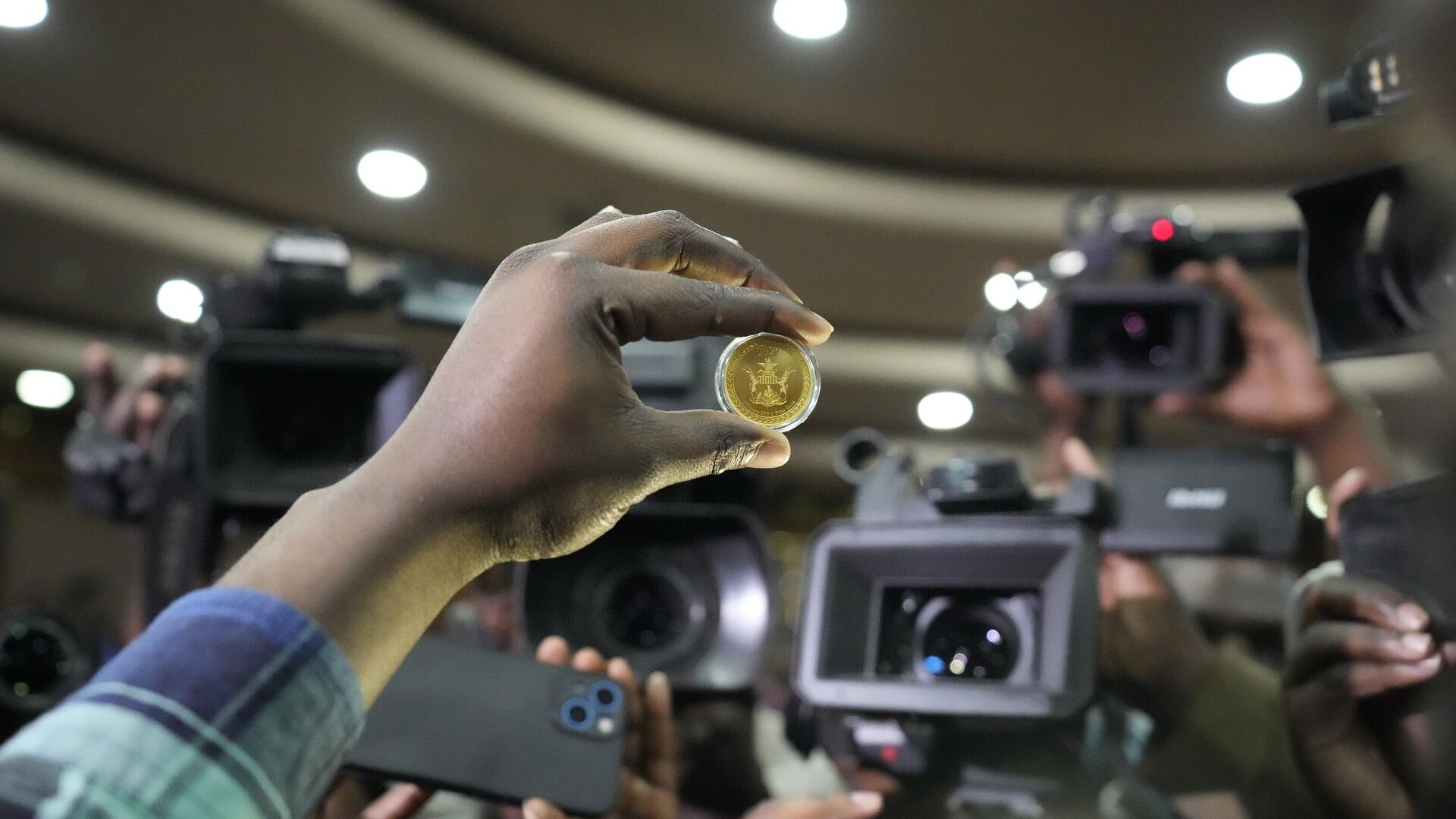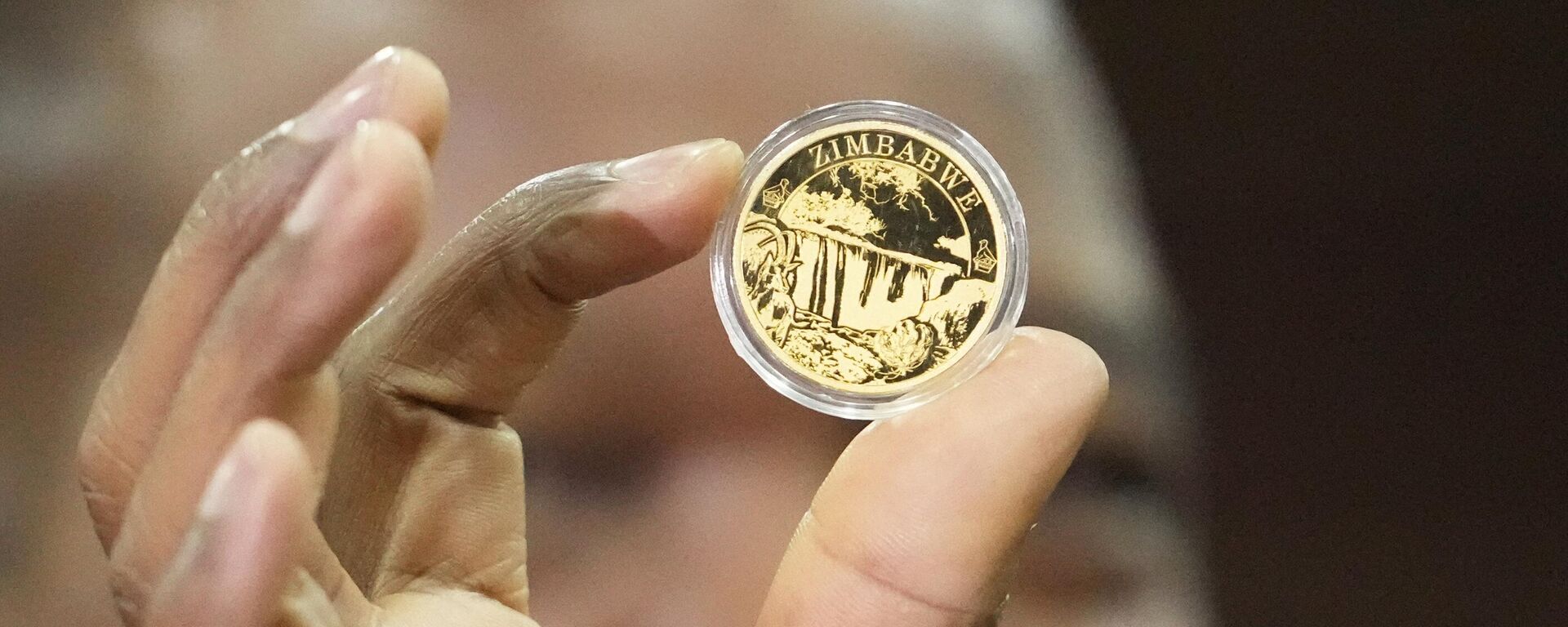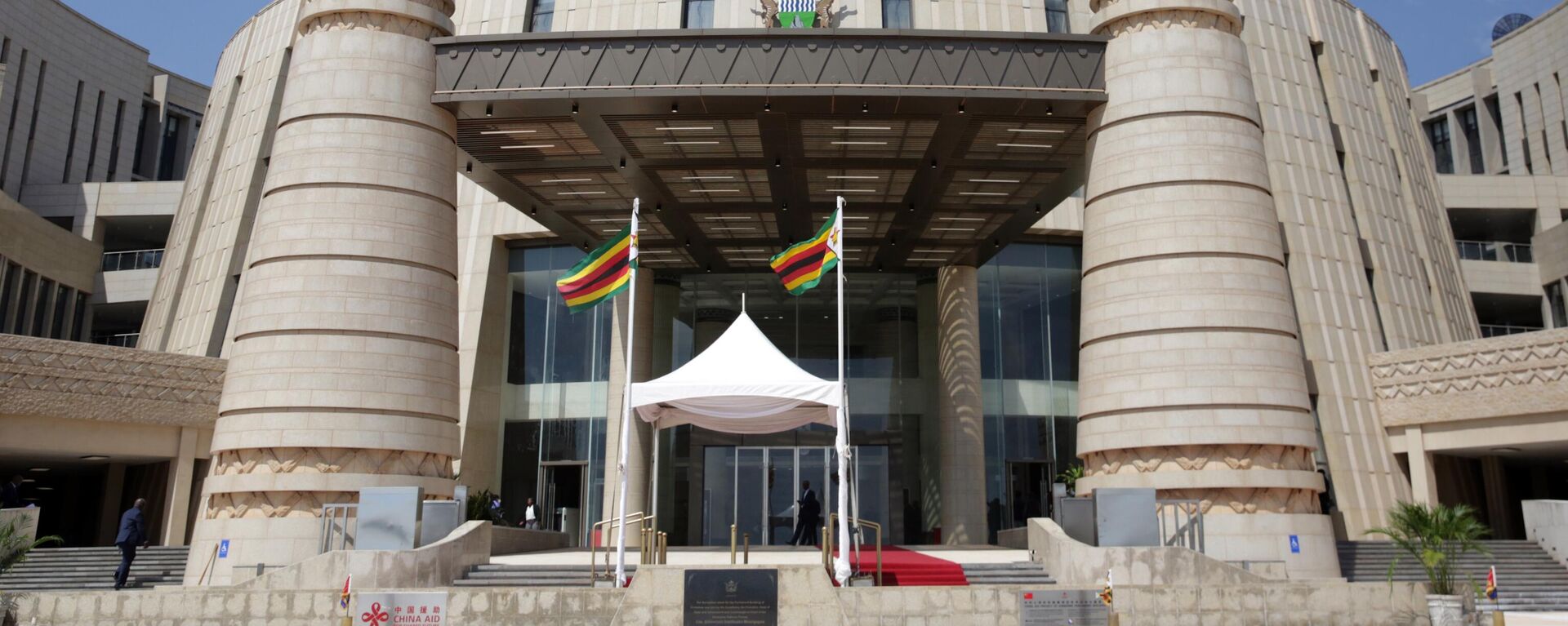https://en.sputniknews.africa/20230513/zimbabwes-new-gold-backed-digital-currency-offers-opportunities-risks-experts-say-1059230949.html
Zimbabwe's New Gold-backed Digital Currency Offers Opportunities, Risks, Experts Say
Zimbabwe's New Gold-backed Digital Currency Offers Opportunities, Risks, Experts Say
Sputnik Africa
Zimbabwe announced the release of a new gold-backed digital national currency, with the primary objective of curbing the country's soaring inflation. In light of this, we spoke with two experts about its opportunities and risks.
2023-05-13T18:50+0200
2023-05-13T18:50+0200
2023-05-13T18:50+0200
sub-saharan africa
southern africa
zimbabwe
currency
alternative currency
cryptocurrencies
https://cdn1.img.sputniknews.africa/img/07e7/05/0d/1059234656_0:0:3072:1728_1920x0_80_0_0_f1f9516ba3bf9d0d4c7c5c78a8fcd0ee.jpg
Less than a year after the Reserve Bank of Zimbabwe (RBZ) introduced one-ounce, 22-karat gold coins into circulation in an attempt to curb the country's soaring inflation following the failed reintroduction of the Zimbabwe dollar in 2019, the RBZ has now launched a new gold-backed digital currency.Zimbabwe has had a tumultuous economic history, with its currency experiencing hyperinflation and losing value rapidly. Zimbabwe's economic system was particularly devastated by harsh US and EU sanctions imposed against the country more than 20 years ago.In 2009, the southern African nation abandoned the Zimbabwean dollar and adopted a multi-currency system, with the US dollar becoming the most widely used currency in the country. However, in 2019, the Zimbabwean government was forced to abandon the use of the multi-currency system due to cash shortages and replace it with the new Zimbabwean Real Time Gross Settlement (RTGS) dollar.The new e-currency is designed to allow people who have small amounts of Zimbabwean RTGS dollars to exchange them for digital tokens that can store value and protect them from currency fluctuations.In light of this development, Sputnik spoke with two Russian experts about the opportunities and risks of using such a financial instrument.Angelina Akimenko, digital currency expert, pointed out that the significant monetary issue in Zimbabwe currently is hyperinflation of the national currency. According to her, Zimbabweans are selling the Zimbabwean dollar en masse and buying foreign currency in order to hedge against inflationary risks. This has led to a continuous decline in the value of the Zimbabwean dollar.To address these issues, Akimenko said, one of the tasks of regulators is to create investment alternatives with a hedging function for individuals and organizations. The introduction of gold coins in 2022, which are denominated in ounces, was a measure used to combat inflation in Zimbabwe by creating an independent investment instrument.The expert argued that the recently launched gold tokens are intended to create a digital version of the gold coins already in circulation, which are backed by gold but do not replace the Zimbabwean dollar. In addition, individuals will be able to exchange physical gold coins for digital gold-backed tokens.Akimenko added that tokenized gold is a potential investment asset that may appeal to investors because of several advantages, including the creation of a stable investment vehicle, ability to invest without physically holding the asset, easy asset transacting and transfer, and transparency of rights accounting.Meanwhile, the use of the gold-backed digital currency in settlement functions is fraught with risks, such as the threat to the payment stability of the national currency, the possibility of counterparties rejecting the digital currency at the global level due to mistrust in the issuer, and pricing issues related to the volatility of the gold price on trading exchanges, she noted.Speaking about the benefits and risks of the new Zimbabwean e-currency, the International Monetary Fund (IMF) has advised the Zimbabwean government against using a gold-backed digital currency to address economic challenges, such as the instability of the local currency.Instead, the IMF recommended that the government liberalize its foreign-exchange market, warning that introducing a gold-backed digital currency as legal tender alongside the Zimbabwean dollar could undermine remaining confidence in the local currency.According to Andrey Kudryavtsev, a specialist in African economics, the IMF's opposition to the introduction of tokenized gold stems from its belief that such assets will not be effective in the fight against inflation.Kudryavtsev noted that Zimbabwe's previous experience with the circulation of physical gold coins had been problematic, and that gold, as a commodity, is also subject to volatility. Therefore, he believes that the IMF's concerns about the risks associated with the gold-backed token initiative are justified. In his opinion, macro-economic risks, financial stability risks, as well as legal and operational risks, should all be carefully assessed before introducing such a system.According to the expert, cryptocurrencies are becoming increasingly popular in Africa, especially in countries like Nigeria, Morocco, and Kenya. However, Kudryavtsev warns that it is still too early to talk about real competition to traditional currencies such as the dollar and the euro. Kudryavtsev explained that this is due to the specific technological processes required to make payments and settlements in digital currencies, as well as the need to expand and improve the regulatory framework of African countries.Nonetheless, as financial decentralized technologies continue to develop, cryptocurrencies may become more widespread and offer greater competition to traditional currencies in the future, he noted.
https://en.sputniknews.africa/20230510/a-game-changer-all-you-need-to-know-about-zimbabwes-gold-backed-digital-currency-1059150252.html
https://en.sputniknews.africa/20230512/zimbabwe-moves-to-stabilize-local-currency-under-enormous-pressure-1059197229.html
southern africa
zimbabwe
Sputnik Africa
feedback@sputniknews.com
+74956456601
MIA „Rossiya Segodnya“
2023
Muhammad Nooh Osman
https://cdn1.img.sputniknews.africa/img/07e7/04/0a/1058467512_0:0:1280:1280_100x100_80_0_0_ec723833bcbfcaed2e21952965ad99e4.jpg
Muhammad Nooh Osman
https://cdn1.img.sputniknews.africa/img/07e7/04/0a/1058467512_0:0:1280:1280_100x100_80_0_0_ec723833bcbfcaed2e21952965ad99e4.jpg
News
en_EN
Sputnik Africa
feedback@sputniknews.com
+74956456601
MIA „Rossiya Segodnya“
Sputnik Africa
feedback@sputniknews.com
+74956456601
MIA „Rossiya Segodnya“
Muhammad Nooh Osman
https://cdn1.img.sputniknews.africa/img/07e7/04/0a/1058467512_0:0:1280:1280_100x100_80_0_0_ec723833bcbfcaed2e21952965ad99e4.jpg
southern africa, zimbabwe, currency, alternative currency, cryptocurrencies
southern africa, zimbabwe, currency, alternative currency, cryptocurrencies
Zimbabwe's New Gold-backed Digital Currency Offers Opportunities, Risks, Experts Say
Muhammad Nooh Osman
Writer/Editor
On Monday, Zimbabwe's Reserve Bank announced the release of a new gold-backed digital national currency, with the primary objective of curbing the country's soaring inflation rates, and also to strengthen the value of the Zimbabwean dollar, which has struggled in comparison to major currencies since its reintroduction.
Less than a year after the Reserve Bank of Zimbabwe (RBZ) introduced one-ounce, 22-karat gold coins into circulation in an attempt to curb the country's soaring inflation following the failed reintroduction of the Zimbabwe dollar in 2019, the RBZ has
now launched a new gold-backed digital currency.
Zimbabwe has had a tumultuous economic history, with its currency experiencing hyperinflation and losing value rapidly. Zimbabwe's economic system was particularly devastated by harsh US and EU sanctions imposed against the country more than 20 years ago.
In 2009, the southern African nation abandoned the Zimbabwean dollar and adopted a multi-currency system, with the US dollar becoming the most widely used currency in the country. However, in 2019, the Zimbabwean government was forced to abandon the use of the multi-currency system due to cash shortages and replace it with the new Zimbabwean Real Time Gross Settlement (RTGS) dollar.
The new e-currency is designed to allow people who have small amounts of Zimbabwean RTGS dollars to exchange them for digital tokens that can store value and protect them from currency fluctuations.
In light of this development, Sputnik spoke with two Russian experts about the opportunities and risks of using such a financial instrument.
Angelina Akimenko, digital currency expert, pointed out that the significant monetary issue in Zimbabwe currently is hyperinflation of the national currency. According to her, Zimbabweans are selling the Zimbabwean dollar en masse and buying foreign currency in order to
hedge against inflationary risks. This has led to a continuous decline in the value of the Zimbabwean dollar.
To address these issues, Akimenko said, one of the tasks of regulators is to create investment alternatives with a hedging function for individuals and organizations. The introduction of gold coins in 2022, which are denominated in ounces, was a measure used to combat inflation in Zimbabwe by creating an independent investment instrument.
The expert argued that the recently launched gold tokens are intended to create a digital version of the gold coins already in circulation, which are backed by gold but do not replace the Zimbabwean dollar. In addition, individuals will be able to exchange physical gold coins for digital gold-backed tokens.
"The problem is that this measure may not curb inflation, which is largely rooted in the issuance policies of Zimbabwe's national regulator," Akimenko said. "In this regard, when talking about the opportunities and risks of using such an instrument, one should distinguish the purposes for which it can be used."
Akimenko added that
tokenized gold is a potential investment asset that may appeal to investors because of several advantages, including the creation of a stable investment vehicle, ability to invest without physically holding the asset, easy asset transacting and transfer, and transparency of rights accounting.
Meanwhile, the use of the gold-backed digital currency in settlement functions is fraught with risks, such as the threat to the payment stability of the national currency, the possibility of counterparties rejecting the digital currency at the global level due to mistrust in the issuer, and pricing issues related to the volatility of the gold price on trading exchanges, she noted.
"If the risks described above are accepted and measures are taken to minimize them, such an asset could be used as a means of international settlement by both Zimbabwe and other countries. However, the practical use of such locally backed stablecoins requires further study of the business case and regulatory processes in each country," the Russian expert concluded.
Speaking about the benefits and risks of the new Zimbabwean e-currency, the International Monetary Fund (IMF) has advised the Zimbabwean government against using a gold-backed digital currency to address economic challenges, such as the instability of the local currency.
Instead, the IMF recommended that the government liberalize its foreign-exchange market, warning that introducing a gold-backed digital currency as legal tender alongside the Zimbabwean dollar could undermine remaining confidence in the local currency.
According to Andrey Kudryavtsev, a specialist in African economics, the IMF's opposition to the introduction of tokenized gold stems from its belief that such assets will not be effective in the fight against inflation.
Kudryavtsev noted that Zimbabwe's previous experience with the circulation of physical gold coins had been problematic, and that gold, as a commodity, is also subject to volatility. Therefore, he believes that the IMF's concerns about the risks associated with the gold-backed token initiative are justified.
In his opinion, macro-economic risks, financial stability risks, as well as legal and operational risks, should all be carefully assessed before introducing such a system.
"The IMF also warns regulators around the world against the introduction of alternative payment instruments outside their control. For example, the IMF has repeatedly stated the significant risks associated with the recognition of bitcoin as an official tender in El Salvador and the Central African Republic," Kudryavtsev said.
According to the expert, cryptocurrencies are becoming increasingly popular in Africa, especially in countries like Nigeria, Morocco, and Kenya. However, Kudryavtsev warns that it is still too early to talk about real competition to traditional currencies such as the dollar and the euro.
Kudryavtsev explained that this is due to the specific technological processes required to make payments and settlements in digital currencies, as well as the need to expand and improve the regulatory framework of African countries.
Nonetheless, as financial decentralized technologies continue to develop, cryptocurrencies may become more widespread and offer greater competition to traditional currencies in the future, he noted.




